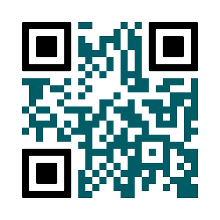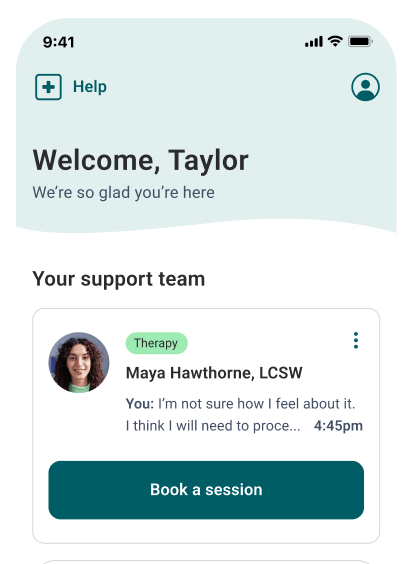Post-traumatic stress disorder test
Is it just a phase or something more? Take our short online PTSD test to find out if you're living with PTSD.

Youarenotalone
Everyone experiences bad memories and fears that seem to creep up when you least expect them. But for for the 7.7 million trauma survivors in the U.S. who suffer from PTSD, the triggers can be numerous and the nightmares can feel insurmountable.
Take control of PTSD
When you're up against nightmares and unwanted memories of a traumatic event, things may feel like they'll never change. But you don't have to manage PTSD symptoms alone. Our network has thousands of licensed therapists and prescribers experienced in treating PTSD. After taking the self PTSD test, you can get matched with a dedicated therapist to help you work through difficult feelings and memories of a stressful experience. We’ll help you achieve your mental health goals — all from the privacy of your device.
*Copays represented are averages. Members in high-deductible health plans must satisfy the deductible before copays apply. Check your policy to confirm coverage details.
Your copay could
be as low as
Average copay per session for covered members is
Enter your insurance details to verify your coverage today.
More than 60,000
5-star reviews
Read why people love using Talkspace.
See all reviews
Any questions?
Find trust-worthy answers on all things mental health at Talkspace.

How is post-traumatic stress disorder (PTSD) diagnosed?
For an individual to be diagnosed with PTSD, that person must experience certain symptoms that impair their daily functioning for at least one month following a traumatic event. These PTSD symptoms may include flashbacks, disturbing thoughts or dreams, avoiding reminders of the event, having difficulty sleeping, feeling anxious or on edge, difficulty controlling anger, negative thoughts or feelings, and a lack of enjoyment of previously pleasurable activities.
Talkspace providers will conduct a PTSD screening to provide a full diagnosis using the criteria in the American Psychiatric Association's Diagnostic and Statistical Manual of Mental Disorders or DSM-5.
What tests are used to diagnose PTSD?
Several tools are used to assess PTSD, including the Post Traumatic Stress Diagnostic Scale (PDS), The PTSD Checklist (PCL), and the Davidson Trauma Scale (DTS). A mental health professional can administer assessments and can create a personalized treatment plan to support your mental health goals. In addition to multiscale personality inventories, a mental health professional may use self-report documentation and structured interviews to gather additional data to make a PTSD diagnosis.
Can you self-diagnose PTSD?
Several self-assessments for PTSD can be found online. If you frequently find yourself asking "do I have PTSD," these tests may help you gain awareness of your PTSD symptoms, but only a licensed mental health professional can make a mental health diagnosis.
Share your concerns with a mental health care professional to help them correctly diagnose and develop a trauma treatment plan for you.
What are the main signs and symptoms of PTSD?
Post-traumatic stress disorder (PTSD) is a psychiatric mental health condition that may occur in people who have experienced or witnessed a traumatic event. The signs of PTSD may be subtle, especially since people can experience PTSD in different ways. Symptoms can range from having angry outbursts, feeling intense fear, or experiencing intrusive thoughts.
Other main symptoms of PTSD include (but aren’t limited to):
- Re-experiencing symptoms: can include flashbacks and tendency to relive a traumatic event, especially through triggers that cause a person to relive distressing memories.
- Avoidance symptoms: seen when someone takes extreme measures, such as taking new routes or avoiding certain people, in an effort to not be reminded of the traumatic experience.
- Hyperarousal symptoms: includes being alert to danger at all times, especially leading to a “fight or flight” response.
- Cognition & mood symptoms: can include symptoms that impact a person's memory and emotions, such as having negative self thoughts or feeling extreme guilt
If you suspect that you or someone you know is struggling with these symptoms, taking our clinically-backed PTSD test acts as a great first step to finding mental health treatment options.
Who is at risk for PTSD?
Anyone, at any age, can develop PTSD following a traumatic event, including children, teens, and adults. Those who experience traumatic events involving deliberate harm (such as physical or sexual assault) or have repeated traumatic experiences (such as childhood trauma or domestic violence), may be at greater risk of PTSD.
Additionally, PTSD symptoms may worsen for those struggling with depression or an anxiety disorder, or for someone that doesn't have a supportive environment to help them through treatment. Research also suggests that women are more likely to experience PTSD than men, and combat veterans are at increased risk for military PTSD and other mental health conditions.
What are the different types of PTSD?
There are different types of PTSD that all share similar characteristics, including uncomplicated PTSD, complex PTSD, and comorbid PTSD. However, each type has its own nuances based on an individual's specific symptoms, experiences, and trauma.
Remember that these types of PTSD are treatable, and there are treatment options, including online psychiatry and therapy, available to help you lead a healthier life.
What are my treatment options for PTSD?
If you're struggling with PTSD, know that coping techniques are available to help reduce your symptoms. Many people have been very successful at managing PTSD when a combination of psychotherapy, medication, and holistic healing methods are used.
For those interested in PTSD treatment, Talkspace offers convenient, affordable, and effective care from licensed professionals. Our online therapists are here to listen and help you develop strategies for dealing with PTSD, while our psychiatric providers can prescribe the right medication (if appropriate) to treat PTSD.
As you take our PTSD test and explore your options, know that Talkspace is committed to making mental health care accessible by offering online therapy and psychiatry plans that take insurance.










